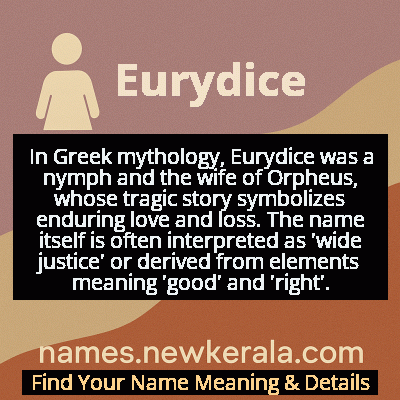Eurydice Name Meaning & Details
Origin, Popularity, Numerology Analysis & Name Meaning of Eurydice
Discover the origin, meaning, and cultural significance of the name EURYDICE. Delve into its historical roots and explore the lasting impact it has had on communities and traditions.
Name
Eurydice
Gender
Female
Origin
Greek
Lucky Number
9
Meaning of the Name - Eurydice
In Greek mythology, Eurydice was a nymph and the wife of Orpheus, whose tragic story symbolizes enduring love and loss. The name itself is often interpreted as 'wide justice' or derived from elements meaning 'good' and 'right'.
Eurydice - Complete Numerology Analysis
Your Numerology Number
Based on Pythagorean Numerology System
Ruling Planet
Mars
Positive Nature
Generous, passionate, energetic, and humanitarian.
Negative Traits
Impulsive, impatient, moody, and can be overly emotional.
Lucky Colours
Red, maroon, scarlet.
Lucky Days
Tuesday.
Lucky Stones
Red coral, garnet.
Harmony Numbers
1, 2, 3, 6.
Best Suited Professions
Military, sports, philanthropy, leadership roles.
What People Like About You
Courage, energy, leadership, generosity.
Famous People Named Eurydice
Eurydice of Thebes
Mythological Queen
Central figure in Sophocles' tragedy Antigone, representing maternal grief and royal authority
Eurydice I of Macedon
Ancient Macedonian Queen
Matriarch of the Argead dynasty, grandmother of Alexander the Great, influential political figure
Eurydice (Hadestown character)
Musical Theater Character
Modern reinterpretation as a struggling young woman in Anaïs Mitchell's acclaimed folk opera
Name Variations & International Equivalents
Click on blue names to explore their detailed meanings. Gray names with will be available soon.
Cultural & Historical Significance
The name's cultural impact extends far beyond its mythological origins. During the Renaissance, Eurydice became a popular subject in opera, most notably in Monteverdi's 'Orfeo' (1607), which helped establish opera as a major art form. In the 20th century, the myth inspired Jean Cocteau's film 'Orpheus' and numerous literary works that reimagined the story from feminist or modern perspectives. The enduring power of the Eurydice narrative lies in its ability to speak to universal human experiences of love, loss, and the painful awareness that some opportunities, once lost, can never be fully recovered. Her character represents not just a passive victim but an active symbol of what it means to be remembered, pursued, and ultimately transformed through love and art.
Extended Personality Analysis
The name Eurydice carries profound psychological associations that often translate into perceived personality characteristics. Those bearing this name are frequently imagined as possessing a dual nature—both earthly and transcendent, practical yet deeply connected to artistic and spiritual realms. The mythological Eurydice's journey through the underworld suggests individuals who have experienced significant personal transformation and emerged with deeper wisdom. They often exhibit remarkable resilience, having navigated their own symbolic 'underworlds' of challenge or loss.
Common traits associated with Eurydice include emotional depth, intuition, and a strong aesthetic sense. These individuals tend to be perceptive about human nature and may possess an almost mystical understanding of life's cycles of loss and renewal. The Orphic myth's emphasis on music and poetry suggests creative talents or at least a deep appreciation for the arts. However, the tragic elements also hint at a certain melancholy or thoughtful seriousness. Modern Eurydices might be drawn to helping professions, artistic pursuits, or spiritual practices that allow them to explore the deeper dimensions of human experience. Their personality often combines practical wisdom with poetic sensibility, making them both grounded and visionary—able to appreciate beauty while understanding life's inherent limitations and sorrows.
Modern Usage & Popularity
In contemporary naming practices, Eurydice occupies a fascinating niche as a name that is both classical and unconventional. While it has never reached mainstream popularity, its usage has seen a gradual increase in the 21st century, particularly among parents seeking names with literary depth and mythological resonance. The name appears more frequently in European countries, especially Greece, France, and Italy, where classical names maintain stronger cultural continuity. In English-speaking countries, Eurydice remains quite rare but has gained visibility through cultural phenomena like the Tony-winning musical 'Hadestown,' which introduced the character to new generations. Modern parents who choose this name typically value its beautiful phonetic qualities, its connection to one of history's great love stories, and its association with artistic and intellectual pursuits. The name's rarity makes it distinctive without being completely unfamiliar, appealing to those who want a unique name that still carries significant cultural weight and historical depth. Its usage trends suggest it may continue to gain slow but steady appreciation as mythological names experience renewed interest.
Symbolic & Spiritual Meanings
Eurydice embodies rich symbolic meanings that transcend her mythological narrative to address universal human experiences. Most profoundly, she represents the soul or essential self that can be glimpsed but not fully possessed—the eternal feminine principle that inspires artistic creation and spiritual seeking. Her story symbolizes the painful truth that some losses are irrevocable and that the attempt to recover what is gone can sometimes lead to greater loss. The moment Orpheus looks back becomes a powerful metaphor for doubt, impatience, or the human inability to fully trust in transformative processes.
Symbolically, Eurydice also represents the connection between the visible and invisible worlds, serving as a bridge between life and death, consciousness and the unconscious. Her descent into and potential return from the underworld mirrors psychological journeys into the depths of the self and the difficult process of integration and healing. The name has come to symbolize the idea that true love requires faith beyond sight and that some relationships transform us precisely through their loss or absence. In broader cultural terms, Eurydice represents the enduring power of memory and art to preserve what time and death would otherwise erase, making her an eternal symbol of how human creativity attempts to triumph over mortality itself.

